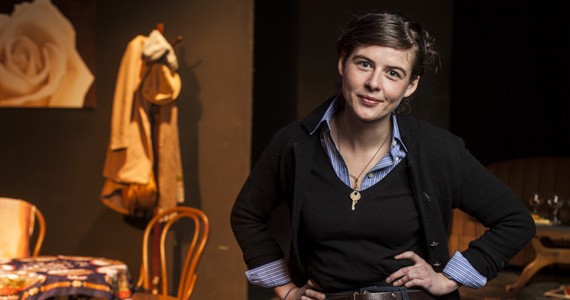The story behind The Bus Stop Theatre is that a bunch of people got together and made it happen," says Clare Waqué, the primary operator of the rental venue on Gottingen Street. Since March 2010, the Bus Stop has hosted independent theatre, art exhibitions, music and literary events at affordable rates. The venue relies on thousands of volunteer hours, Waqué's vision and community support.
After a few years of experience, ensuring financial viability and cultural sustainability, the Bus Stop recently incorporated as a not-for-profit cooperative. This shift to the co-op structure (the operational model for many arts organizations in Canada) will enable the theatre to access public funding, develop programming and offer graduated memberships with fringe benefits. It's a big project with big plans.
"The whole purpose of the co-op is to create a cultural institution, to build a really solid, long-lasting artist-run centre that helps the emerging arts in Halifax, to develop the talent that's here and have a place to showcase it," she says. "It's been a great experiment to try it without this model, but we want to offer the same presentation, opportunities and promotional abilities as other professional theatres."
When Waqué purchased the four-storey building from artist Howard Beye, initially planning to become a co-op, she needed mortgagers to cover 90 percent of the cost. Over time, she hopes the Bus Stop co-op will be strong enough to take ownership of the building as a public institution. But structuring the new organization, including the installation of a board of directors, will take some time and money.
Act One: From now until March 21, the Bus Stop is offering the first round of annual memberships ($200 a person) for those interested in running for the board or developing initial plans. "I'd love the first group of members to be people who have been to Bus Stop events and understand the value, who have an idea of what we do and what we are going to do," Waqué says.
Act Two: After being elected by the general membership, the board will have three months to legally implement the bylaws and mandates of the co-op before the first general meeting in June, at which point the membership will start planning new initiatives like a box office program, promo and admin and paid jobs. Realistic about human resources, Waqué wants the Bus Stop to provide employment in the arts.
Act Three: By the fall, the co-op will offer annual memberships for theatre groups, actors and audiences to engage members with different needs for reasonable prices. All members will be eligible to participate on various operational committees as well, while the co-op seeks public funding.
Although the Bus Stop has always felt like a co-op with its inherent accessibility, Waque is sure that the benefits will make the theatre achieve more, having seen the successes of other arts co-ops.
"If the purpose of the organization is to develop community," says Martha Cooley, interim executive director of the Atlantic Filmmaker's Cooperative (in business since 1974), "to engage people through volunteer work, to foster mentorship and to empower people through decision-making, then the co-op structure is a good fit."
The co-op model will allow the Bus Stop to become what it's always been.
"What I love about this community is that we're all part of it," Waqué says, "It's a whole combination of everybody's efforts that makes the Bus Stop space exciting and makes Halifax a place you want to be, to stay and help build. We are going to build this organization together. That's the dream."

